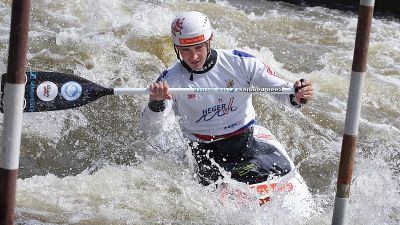The Olympics are not just about sports and the joy of winning: sociologists also look at the role that money, politics and globalisation play in their hosting as well as how the games reflect the shape of the world today. “Basically, all Olympics suffer some controversy, from politics to the displacement of the population, and almost always, overall cost”, says Matouš Veselský, a sociologist at the Faculty of Humanities. Many games come in over over-budget. As a fan, he loves the Olympics, but as a sociologist specializing in sport, his outlook is more critical.
What role do major sporting events like the Olympics play in society?
The impact of the Olympic Games on society is huge. Major sporting events, which sociologists call mega-events, are not just about medals and records, but about a whole range of other phenomena. Sociology notes, for example, that the games are a huge instrument of political power. The Olympic Games, primarily the summer games, are one of the most watched sporting events in the world, alongside the FIFA World Cup. They allow the host nation to influence billions of people and to show itself in the light that it wants.
The impact is also inwards in host country. Countries hosting the Olympics don't just build new stadiums but often a whole new infrastructure - railways, motorways, new neighbourhoods. Such a mega-event can fundamentally change the character of a city. The Olympic Village and the facilities that were built in Barcelona for the 1992 Olympics are still in use today. In London, an entire section of the city was revitalised for the 2012 Games.
Advertising and the commercialisation of the Games play a big role in the context of the Olympics. However, there is a lot of controversy surrounding this. One example is that the biggest sponsors of the Games until 2018 were, somewhat paradoxically, Coca-Cola and McDonald's.
How will society be affected when the Olympic Games are held in countries that do not fully respect democratic principles?
For the organising country it is a powerful tool of power, for the International Olympic Committee it is a bit of a failure. By making such a choice, the Committee is gambling not only with its own reputation, but above all with the reputation of the Olympic Games as a whole. Hosting the Olympics is economically extremely difficult. Many countries have not even wanted to host the Games in recent years because it is a huge burden on the national budget. It is even worse when it comes to the Winter Olympics, because the winter games have a smaller worldwide audience. This may be a factor in the Olympics being held in countries such as the People's Republic of China.
There has been criticism in the past that the Games were only held in rich Western countries and that all countries should be given the chance to host the Games. But even this has caused problems and controversy. The Summer Olympics in Rio de Janeiro plunged an already indebted Brazil into even greater debt. Moreover, in Rio de Janeiro, a large part of the Vila Autodromo slum disappeared because of the Games. Those who did not leave voluntarily at the request of the authorities were forced out.
Could the strategy of portraying itself in a better light through the Olympics backfire on individual countries? After all, a huge amount of media attention turn their attention to the country both before and especially during the Games. Their focus goers far beyond just the sports themselves.
All the countries that decide to organise the Olympic Games have calculated the pros and cons and know what they are doing. The general public, for example, may not be able to see the human rights violations that are being highlighted in connection with China, because they are not interested in such things and are only watching the Games as a sporting event. It is only concerned with athletes’ results, or with how the Games were prepared and how stunning the opening ceremony was. That is what the host country always makes sure it does.
At the start of the Winter Olympics in Beijing, respected Czech TV sports commentator Robert Záruba asked the public not to insult athletes or the journalists going to China, because none of them had voluntarily chosen the country. Instead of uniting continents and society, which the Olympic rings symbolise, this year's Games seem to be divisive.
I agree with Robert Záruba. The kayaker Josef Dostál has made a similar statement, saying publicly that he did not envy colleagues and the position they had been put in by the International Olympic Committee at the winter games. One mistake is where the Olympics are held. Then there is the fact that the Games are so expensive, megalomaniacal and demanding, which means many countries lose interest in hosting them.
But basically every Olympic Games suffers from some controversy, one time it is politics, another, it is the displacement of people, and almost always the Games suffer from cost overruns. All the Olympics since the 1960s have suffered from costing, an average, 176 percent more than originally planned. The 1976 Summer Olympics in Montreal went up in price by nearly 800 per cent, putting the city in debt for the next 30 years.
The last two Olympic Games were marred by the Covid-19 pandemic, which saw spectators excluded from the Games. Doesn't that make the Olympics meaningless? How has this affected the funding of the Games and interest from sponsors?
The Covid-19 pandemic revealed how major sporting events really work. Fans in stadiums are desirable, they add atmosphere. But what mega-events are held for are TV audiences. A big stadium can hold 80,000 spectators, but a few billion can sit in front of the TV. They are all watching the event, the country and the advertising. Of course the host country loses some money if the fans don't come to the games, but the most important thing is to get the event on TV.

Parts of London were revitalized due to the Games. One of the symbols of the Games was the swimming hall, designed by architect Zaha Hadid.
As a sociologist, you are interested in the phenomenon of fandom and cheering at games. Can the fan experience through a screen or radio be as powerful as being in the stadium?
I've interviewed people who watch and go to sports matches. The atmosphere in the stadium is special. The opportunity to be physically at the action is something special in a particular person's life and memory. On the other hand, the current broadcasting possibilities and the huge amount of information available to people today via the Internet can simulate the situation very well. Moreover, many people say that when they go to a football stadium, for example, they also experience many unpleasant things there - smoke bombs, overcrowding, poorer visibility. At home, in front of a big screen with all the comfort and replays, you can have a much more comfortable experience of the game. Sociologists note that it's not so much being in the stadium that matters, but sharing the situation with other people. That's why people go to different sports bars where they cheer for their favourite teams or athletes in a group. This also confirms the importance of televising the Games. The relationship between media and sports and the role of sports broadcasting in society is a big topic in sociology.

Facilities built specifically for the Games do not always find further use. The winter sports complex built for the 1984 Sarajevo Olympics is now
covered in moss. The site was damaged beyond repair during the war in Bosnia and Herzegovina.
Is sport still even a “game” today? Or is it something else?
The game is what makes people watch sports. It evokes emotions - passion, joy, sadness. That's what people love about sport. But the game of sport can sometimes go beyond the field and influence events of society. When the Brazilians lost 1-7 to Germany in the semi-finals at the 2014 World Cup, Brazilian fans set fire to buses in the streets out of frustration. So it was 'just' a game, but the consequences were very real. In fact, the game becomes a reflection of society itself. We see this in the Olympics, in the media coverage and globalisation of sport, and in social inequalities in sport.
Sociologists say that sport is what society is. Czechs are football and hockey lovers. What does that say about our society?
That is a difficult question and no sociologist has ever looked into it. Football is a worldwide phenomenon. The whole world loves it. FIFA has more members than the United Nations, so that is to some extent due to the fact that, for example, Great Britain is one country in the UN, whereas in FIFA it is divided into individual associations: English, Scottish, Welsh, Northern Irish.
But hockey is our domestic phenomenon. In 1908, the Czech Ice Hockey Association was founded. In 1933, the first World Ice Hockey Championship was held here. Although it was a novelty in our country at the time, the championship caused quite a stir throughout Czechoslovakia. The Czechoslovaks won bronze and were the best team in Europe. Suddenly everyone knew the game, which had been fairly unknown here until then. This was repeated in 1947 [And in 1949, read an interview with one of the fortmer players here - ed. note], when the first post-war World Championship was held in Prague. The Czechoslovaks won, and our society was completely euphoric.
The matches with the Soviets after 1968 are a chapter in themselves. Their viewing figures on Czechoslovak television were regularly between 80 – 90 per cent. When matches were played, almost everyone watched. The next wave of fans was sparked by the national team's victory at the 1998 Nagano Olympics. And it continues to this day. The IIHF 2015 World Ice Hockey Championships, held in the Czech Republic, is still the most attended championship in the history, and all this at a time when the Czech national team has not been doing too well. The love of hockey must have been passed down from one generation to the next.
| Matouš Veselský |
| Matouš Veselský’s research interests include historical sociology with a focus on the sociology of sport. He is a Ph. D. student at the Faculty of Humanities of Charles University, where he also teaches his own seminar on the sociology of sport. His dissertation deals with the topic of medium-sized sporting events and their impact on society using the specific example of the Ice Hockey World Championship from the perspective of its organizers. It also deals with the phenomenon of the game and sports fandom. In 2020, he won the Science Slam competition. He originally considered studying at the Academy of Performing Arts in Prague (DAMU), but eventually decided to apply his talent in teaching and also in organizing a number of cultural and social events at the Faculty of Humanities. |




















